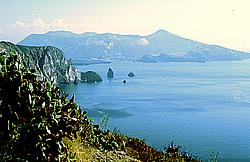| |
 |
 |
 |
|
The
archpelago of Eolian Islands : Strait of Vulcano.
|
|
Aeolus receives
Odysseus and his troup ostentatiously, during a whole month, invites them
to banquet, listens to the Greek hero who narrates him the Trojan War. Then,
when Odysseus and his men want to leave and come back to their natal island,
Ithaca in the Ionian Sea, he provides them with the only resource he really
controls, the winds : "He flays a nine years bull, sews up its skin with
all impetuous winds inside, since Cronus' son (Zeus) has made him the lord
of the winds : at will he excites or appeases them. He gives me the bag
whose shining silver string does not let escape any breeze ; he comes and
fixes it in my boat ; then he makes me blow the breath of a zephyr that
must bring us home, men and boats" (v.19-27). The text is as clear as
could be : Aeolus' function consists in managing the winds, by distributing,
ordering or dispensing them with various force and direction. And the narrator
describes Aeolus' operations : first he imposes calm by keeping the winds
shut up in the leather bag ; then he produces a light north-west wind, zephuros,
proper to drive the fleet of Greek warriors from the Stromboli to the Strait
of Messina and beyond to the Strait of Otranto and Ithaca (map). One knows
how the epic narration goes on : Odysseus' companions take the wind bag
and open it. Immediately the winds break out and a sudden south-east storm,
thuella, (v. 48), drives the fleet back to its starting point. Furious,
Aeolus and his people reject Odysseus and his men who "are hated by fortunate
gods". We have here the epic narration of the difficult contact experienced
by archaic Greek with islands subjected to surprising weather conditions
and with unknown people. We have here a very exact description of sudden
weather changes to which foreign navigaors were exposed in these waters,
of these violent and unforeseen south-east winds that Lipariots today call
bourrascas, squalls. It is these sudden and unceasing weather changes
that we want to study.  |



